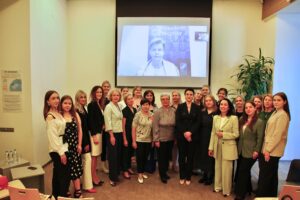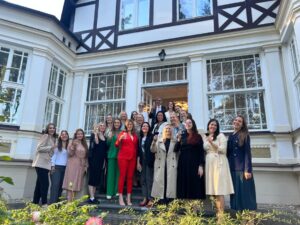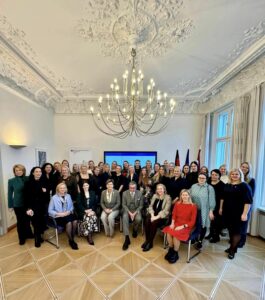As part of their focus on Women, Peace and Security, the Latvian Transatlantic Organisation (LATO) launched its first initiative at the Rīga Conference 2020 with a discussion. In 2021, a series of different initiatives on behalf of LATO have been established including upcoming publications and a documentary film. In 2022 The Rīga Conference continues to lead the pace with a dedicated panel discussion and a new mentoring program has been launched for aspiring young leaders.
The promise of the Women, Peace and Security agenda set by the United Nations provides a framework for sustainable peace amidst a global crisis, and it is powered by a fearless women’s movement that knows few bounds. But, while the agenda has strong support from governments all over the world, that support hasn’t plugged the persistent implementation gaps. This is also the case in Latvia and the Baltics.
The general public’s knowledge on the importance, leadership and influence of women enlisted within the defence, military and security sectors is quite minimal and their role in defence is often overlooked. Therefore, LATO has been working on developing a series of initiatives with an overarching aim of raising awareness and understanding on women in the defence, military and security sectors.The LATO Mentoring Program for Women Professionals tries to tackle these challenges by providing a supportive network of mentors at an arm’s reach.
The LATO Mentoring Program for Women Professionals targets young professionals from Latvia to connect them with multiple highly ranked, highly achieving and highly reputed women professionals in the defence and foreign affairs sectors. By connecting both the successful and the aspiring leaders, the program bridges the gap in understanding and support and aims to create a long-term network of like-minded individuals.
The program will consist of training sessions, discussions and individual consultations with mentors.
By establishing this Mentoring Program, LATO not only encourages the growth of young professionals and raises awareness of the need for such encouragement at different levels.
The mentoring program is supported by the German Embassy in Riga and the Ministry of Foreign Affairs of the Republic of Latvia.
The aim of the LATO initiatives on Women, Peace and Security is threefold:
1. To foster the aims of LATO and inform the public on issues related to defence, military and security aspects influenced by women. This is to be achieved through public discussion and informative campaigns such as the planned documentary film.
2. To provide support for young professional women in establishing their roots and encouraging their careers in the defence, military and security sectors.
3. To generate academic discourse at a high level on issues related to Women, Peace and Security and to provide recommendations of a fully inclusive nature for policy development related to women professionals.




 In August 2023, LATO launched the ” Women, Peace and Security” project under the WPS Mentoring Programme. The mentoring programme for young professional women ran from October to December 2023. During the programme, participants had the opportunity not only to interact actively with their mentors, but also to participate in a number of specialised lectures, e.g. on cyber security, human rights, combating violence, etc. Several networking events and informal conversations also took place. For example, the mentoring programme offered participants the opportunity to attend a specialised launch event for Lolita Cigane’s book “A Woman in Politics” at the French Embassy. A discussion with Lieutenant General Jenny Carignan of the Canadian Armed Forces was organised with the support of the Embassy of Canada. The mentoring programme was supported by the German Embassy in Latvia and the Ministry of Foreign Affairs of the Republic of Latvia.
In August 2023, LATO launched the ” Women, Peace and Security” project under the WPS Mentoring Programme. The mentoring programme for young professional women ran from October to December 2023. During the programme, participants had the opportunity not only to interact actively with their mentors, but also to participate in a number of specialised lectures, e.g. on cyber security, human rights, combating violence, etc. Several networking events and informal conversations also took place. For example, the mentoring programme offered participants the opportunity to attend a specialised launch event for Lolita Cigane’s book “A Woman in Politics” at the French Embassy. A discussion with Lieutenant General Jenny Carignan of the Canadian Armed Forces was organised with the support of the Embassy of Canada. The mentoring programme was supported by the German Embassy in Latvia and the Ministry of Foreign Affairs of the Republic of Latvia. Another important part of the project was the specialised negotiation courses for young female professionals from the Baltic States. In December 2023, under the guidance of a specialist from the Clingendael Institute, young professionals had the opportunity to acquire a specific set of knowledge and skills for successful negotiation and the defence of their position. According to the feedback, the young professionals are already actively and successfully applying the knowledge acquired during the course in their daily professional activities.
Another important part of the project was the specialised negotiation courses for young female professionals from the Baltic States. In December 2023, under the guidance of a specialist from the Clingendael Institute, young professionals had the opportunity to acquire a specific set of knowledge and skills for successful negotiation and the defence of their position. According to the feedback, the young professionals are already actively and successfully applying the knowledge acquired during the course in their daily professional activities. The third activity under the Women, Peace and Security Programme in 2023 was an information campaign on women’s equality issues in the security domain. The information campaign produced and disseminated on social media specialised materials on this topic. Through sponsored content on social media such as Facebook, Twitter and Instragram, these materials were disseminated to a wider audience in Latvia.
The third activity under the Women, Peace and Security Programme in 2023 was an information campaign on women’s equality issues in the security domain. The information campaign produced and disseminated on social media specialised materials on this topic. Through sponsored content on social media such as Facebook, Twitter and Instragram, these materials were disseminated to a wider audience in Latvia.